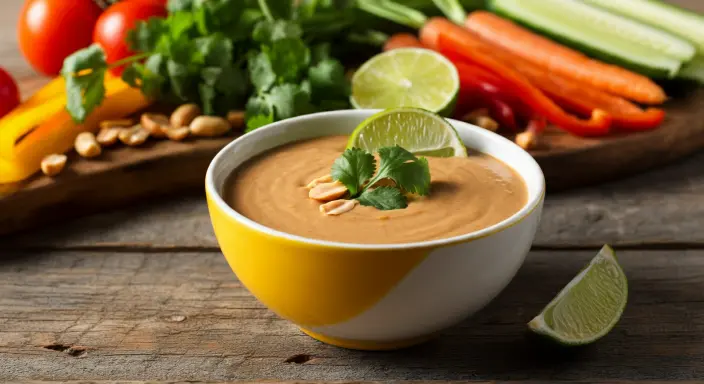Transformative Easy Vegetarian Peanut Sauce Recipe: Quick & Delicious!
Peanut sauce is a beloved condiment that transcends cultural boundaries and culinary styles. Whether you’re drizzling it over a vibrant salad, using it as a dip for fresh vegetables, or incorporating it into a stir-fry, this easy vegetarian peanut sauce recipe is a game-changer in the kitchen. Its creamy texture and nutty flavor can elevate even the simplest of dishes, transforming them into gourmet experiences. In this article, we’ll explore the simplicity of making peanut sauce, its nutritional benefits, and tips for customizing it to suit your taste. Let’s dive into the world of flavors that this versatile sauce brings to your meals!
Key Aspects of Easy Vegetarian Peanut Sauce
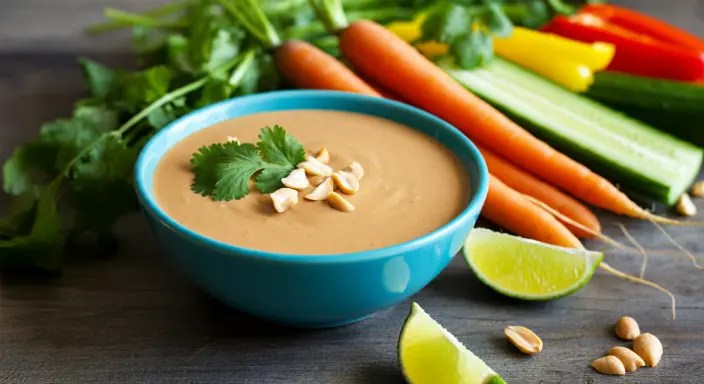
Peanut sauce is not only delicious but also incredibly versatile. According to a study by the USDA, peanuts are rich in protein, healthy fats, and essential vitamins, making them a nutritious addition to any diet. The creamy texture of peanut sauce can elevate simple dishes, transforming them into gourmet experiences. Additionally, its adaptability means you can use it in various cuisines, from Thai to American, making it a staple in many households.
Nutritional Profile of Peanuts
Peanuts are often misunderstood as nuts, but they are technically legumes. They are packed with nutrients, including:
- Protein: Peanuts provide a substantial amount of protein, making them an excellent choice for vegetarians and vegans.
- Healthy Fats: They are rich in monounsaturated fats, which are beneficial for heart health.
- Vitamins and Minerals: Peanuts contain essential vitamins such as Vitamin E, B vitamins, and minerals like magnesium and phosphorus, which play vital roles in various bodily functions.
The Versatility of Peanut Sauce
One of the most appealing aspects of peanut sauce is its versatility. It can be used in a variety of dishes, including:
- Salads: Drizzle it over a fresh salad to add flavor and creaminess.
- Noodles: Toss it with noodles for a quick and satisfying meal.
- Dips: Serve it as a dip for fresh vegetables or spring rolls.
- Marinades: Use it as a marinade for grilled tofu or vegetables.
The possibilities are endless, making peanut sauce a must-have in your culinary repertoire.
Ingredients List
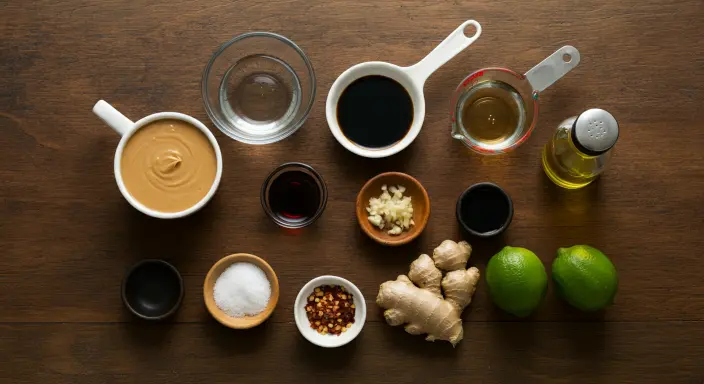
Creating your own peanut sauce at home is simple and requires just a few ingredients. Here’s what you’ll need:
- 1 cup creamy peanut butter: Choose a natural peanut butter without added sugar or hydrogenated oils for the best flavor and health benefits.
- 1/4 cup soy sauce (or tamari for gluten-free): This adds a savory umami flavor to the sauce.
- 1/4 cup water (adjust for desired consistency): Water helps to thin the sauce to your preferred texture.
- 2 tablespoons rice vinegar: This adds acidity and brightness to the sauce.
- 2 tablespoons maple syrup (or honey for non-vegan): A touch of sweetness balances the savory flavors.
- 1 tablespoon sesame oil: This adds a rich, nutty flavor to the sauce.
- 2 cloves garlic, minced: Fresh garlic enhances the overall taste.
- 1 teaspoon fresh ginger, grated: Ginger adds warmth and depth to the sauce.
- 1/2 teaspoon red pepper flakes (optional, for heat): Adjust this according to your spice preference.
- Fresh lime juice (to taste): Lime juice adds a refreshing zing that brightens the sauce.
Step-by-Step Instructions
Making peanut sauce is quick and easy. Here’s a step-by-step guide to help you create your own delicious sauce:
Step 1: Gather Your Ingredients
Before you start, make sure you have all the ingredients on hand. This will streamline the process and make cooking more enjoyable.
Step 2: Mix the Base
In a medium bowl, combine the creamy peanut butter, soy sauce, and rice vinegar. Use a whisk or a fork to mix until smooth. This forms the base of your peanut sauce.
Step 3: Add Water Gradually
Slowly add water to the mixture, stirring continuously until you reach your desired consistency. If you prefer a thinner sauce, add more water. Keep in mind that the sauce will thicken slightly as it sits.
Step 4: Incorporate Sweetness and Flavor
Add the maple syrup, sesame oil, minced garlic, grated ginger, and red pepper flakes. Stir well to combine all the flavors. Taste the sauce and adjust any ingredients to your liking. If you want it sweeter, add more maple syrup; if you prefer it spicier, increase the red pepper flakes.
Step 5: Adjust Seasoning
Taste the sauce and adjust the flavor with fresh lime juice, salt, or additional maple syrup as needed. The balance of flavors is essential, so don’t hesitate to tweak it to suit your palate.
Step 6: Serve or Store
Use the sauce immediately or store it in an airtight container in the refrigerator for up to a week. If the sauce thickens in the fridge, simply stir in a bit of water to loosen it before using.
Nutritional Value
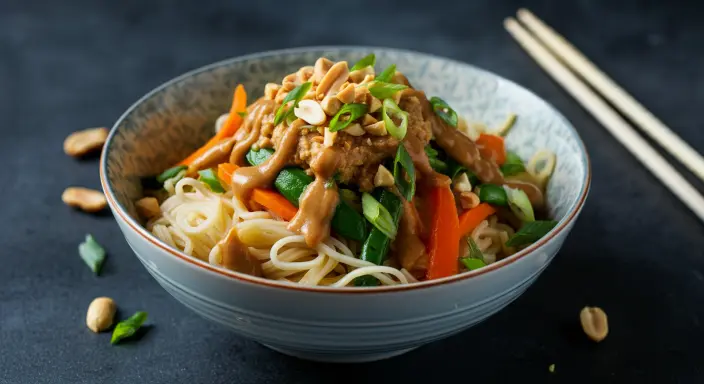
Peanut sauce not only enhances the flavor of your dishes but also adds nutritional value. Here’s a detailed breakdown of the nutritional benefits of the primary ingredients:
| Ingredient | Serving Size | Calories | Protein | Fat | Carbohydrates | Fiber | Sugar |
|---|---|---|---|---|---|---|---|
| Peanut Butter | 2 tbsp | 188 | 8g | 16g | 6g | 2g | 1g |
| Soy Sauce | 1 tbsp | 11 | 1g | 0g | 1g | 0g | 0g |
| Rice Vinegar | 1 tbsp | 0 | 0g | 0g | 0g | 0g | 0g |
| Maple Syrup | 1 tbsp | 52 | 0g | 0g | 13g | 0g | 12g |
| Sesame Oil | 1 tbsp | 120 | 0g | 14g | 0g | 0g | 0g |
| Garlic | 1 clove | 4 | 0g | 0g | 1g | 0g | 0g |
| Ginger | 1 tsp | 2 | 0g | 0g | 0g | 0g | 0g |
| Red Pepper Flakes | 1/2 tsp | 3 | 0g | 0g | 1g | 0g | 0g |
| Lime Juice | 1 tbsp | 4 | 0g | 0g | 1g | 0g | 0g |
Total Nutritional Value for the Entire Recipe (Approximately 1 Cup)
- Calories: 378
- Protein: 9g
- Fat: 30g
- Carbohydrates: 22g
- Fiber: 2g
- Sugar: 13g
Health Benefits of Peanut Sauce
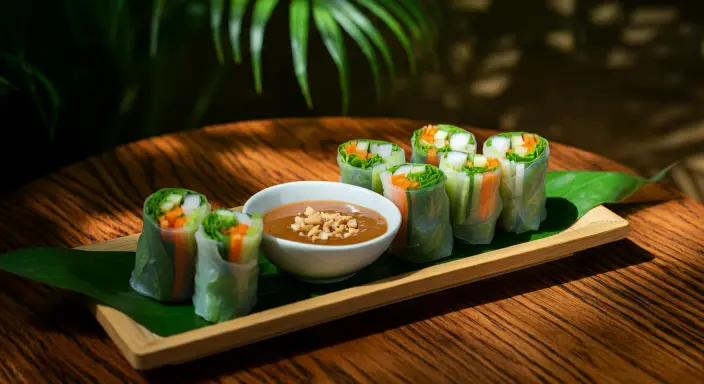
In addition to being delicious, peanut sauce boasts several health benefits:
- Heart Health: The monounsaturated fats in peanuts can help reduce bad cholesterol levels, promoting cardiovascular health.
- Protein Power: With a high protein content, peanut sauce can help keep you feeling full and satisfied, making it an excellent addition to vegetarian and vegan diets.
- Antioxidant Properties: Ingredients like garlic and ginger are known for their antioxidant properties, which can help combat oxidative stress in the body.
Benefits of Easy Vegetarian Peanut Sauce
Peanut sauce is not only delicious but also incredibly nutritious. It provides a good source of protein, healthy fats, and essential vitamins. Incorporating peanut sauce into your meals can enhance flavor and add nutritional value. For example, drizzling it over a salad can turn a simple dish into a satisfying meal, while using it as a dip can encourage the consumption of more vegetables.
Real-Life Examples
Imagine a simple bowl of steamed vegetables. By adding a generous drizzle of peanut sauce, you’ve transformed it into a vibrant and flavorful dish that’s not only more enjoyable but also more filling. Similarly, a plain noodle dish can be elevated with the addition of peanut sauce, making it a go-to meal for busy weeknights.
Overcoming Challenges
While making peanut sauce is straightforward, you may encounter some challenges along the way. Here are some common issues and practical solutions:
Common Issue: The Sauce is Too Thick
Solution: If your peanut sauce turns out thicker than desired, gradually add more water until you achieve your desired consistency. Mix well to ensure the water is fully incorporated.
Common Issue: The Flavor is Too Salty
Solution: If the sauce is too salty, balance it out with a bit of maple syrup or lime juice. The sweetness from the maple syrup can help counteract the saltiness, while lime juice adds acidity.
Common Issue: The Sauce is Lumpy
Solution: If you find that your sauce has lumps, try blending it in a blender or food processor until smooth. This will help achieve a creamy consistency.
Future Trends
As plant-based diets continue to rise in popularity, the demand for versatile sauces like peanut sauce is expected to increase. According to market research, the global nut-based sauces market is projected to grow significantly, driven by the demand for healthier, plant-based options. This trend indicates that more people are looking for easy and nutritious recipes to enhance their meals.
The Rise of Plant-Based Cooking
With an increasing number of individuals adopting vegetarian and vegan lifestyles, recipes that feature plant-based ingredients are gaining traction. Peanut sauce, with its rich flavor and creamy texture, fits perfectly into this trend, making it a staple in many households.
Innovations in Peanut Sauce Recipes
As culinary creativity flourishes, expect to see new variations of peanut sauce emerging. From spicy sriracha-infused versions to creamy coconut peanut sauces, the possibilities are endless. This innovation allows home cooks to experiment and tailor the sauce to their preferences, ensuring that peanut sauce remains a favorite for years to come.
Tips and Tricks Section
To make the most of your peanut sauce experience, here are some helpful tips and tricks:
Preparation Tips
- Make Ahead: Prepare your peanut sauce in advance and store it in the refrigerator for quick meal prep throughout the week. This way, you can easily add it to various dishes without having to make it from scratch each time.
- Batch Cooking: Consider making a double batch and freezing half for later use. Peanut sauce freezes well and can be a lifesaver on busy days.
Ingredient Substitutions
- Nut-Free: If you have a nut allergy, you can substitute peanut butter with sunflower seed butter for a similar texture and flavor.
- Sweetener Alternatives: If you prefer not to use maple syrup, agave nectar or coconut sugar can be excellent alternatives.
Flavor Enhancements
- Coconut Milk: For a creamier texture, blend in a little coconut milk. This not only enhances the richness of the sauce but also adds a tropical twist.
- Fresh Herbs: Incorporate fresh herbs like cilantro or basil for added freshness and complexity. These herbs can brighten up the sauce and complement the other flavors beautifully.
Variations and Adaptations
Peanut sauce is incredibly adaptable, allowing you to customize it to fit various dietary needs and preferences. Here are some suggestions:
Gluten-Free
To make this recipe gluten-free, simply substitute soy sauce with tamari or coconut aminos. Both options provide a similar flavor without the gluten.
Spicy
If you enjoy heat, increase the amount of red pepper flakes or add a splash of sriracha for extra kick. Adjust the spice level according to your tolerance.
Creamy Alternative
For a creamier sauce, blend in a little coconut milk or Greek yogurt (if not vegan). This will give the sauce a unique texture and flavor profile.
Asian-Inspired
Add a teaspoon of hoisin sauce or a splash of lime juice for an Asian-inspired twist. These additions can enhance the overall flavor and make the sauce even more versatile.
FAQs Section
Can I Store Peanut Sauce?
Yes, you can store peanut sauce in an airtight container in the refrigerator for up to a week. Just stir well before using, as it may thicken when chilled.
What Can I Use Peanut Sauce With?
Peanut sauce pairs well with salads, spring rolls, grilled vegetables, noodles, and as a dip for fresh veggies. Its versatility makes it a great addition to many dishes.
Can I Freeze Peanut Sauce?
Yes, you can freeze peanut sauce in a freezer-safe container for up to three months. Thaw it in the refrigerator before use, and stir well to restore its creamy texture.
What Are Some Substitutions for Ingredients?
If you don’t have soy sauce, you can use tamari or coconut aminos for a gluten-free option. For peanut butter allergies, consider using sunflower seed butter. Maple syrup can be replaced with agave nectar or honey.
Conclusion
In summary, this easy vegetarian peanut sauce recipe is a versatile and nutritious addition to your culinary repertoire. With its simple ingredients and quick preparation, it can elevate any meal. Experiment with different variations to suit your taste and dietary preferences. Whether you’re drizzling it over a salad, tossing it with noodles, or using it as a dip, peanut sauce is sure to impress.
Don’t forget to share your thoughts and experiences in the comments below, and subscribe for more delicious recipes! Join the community of peanut sauce lovers and discover the endless possibilities this transformative sauce has to offer.

